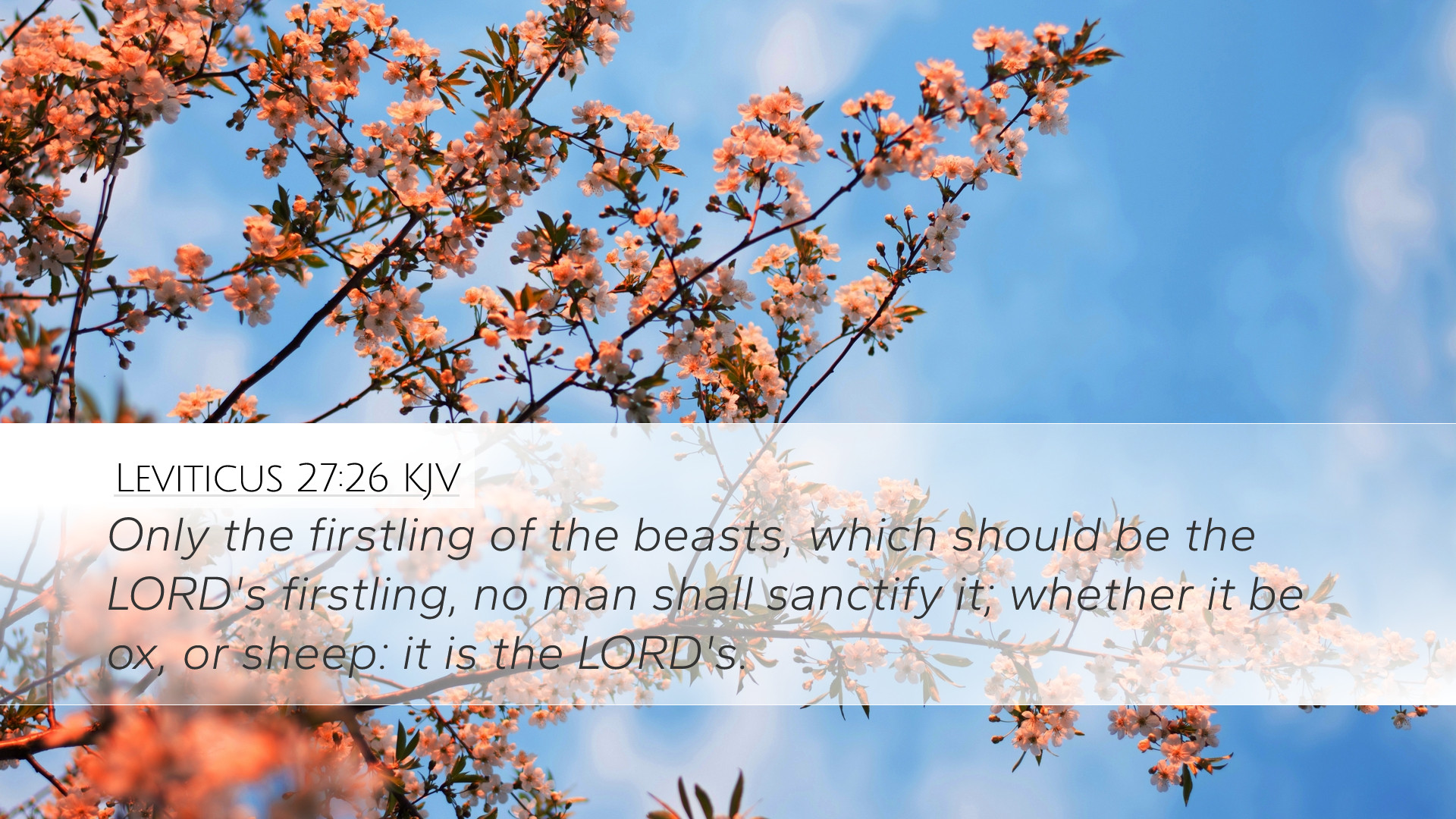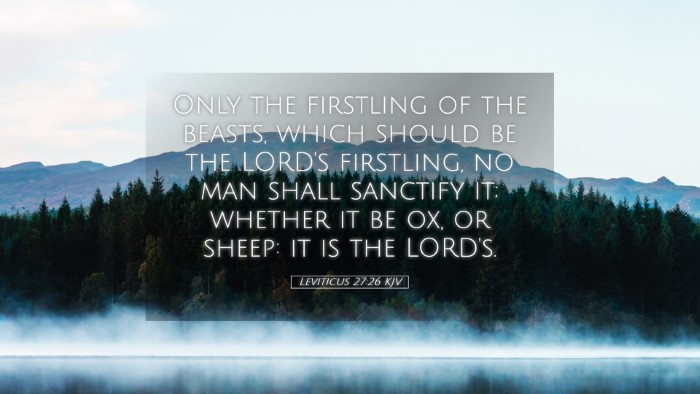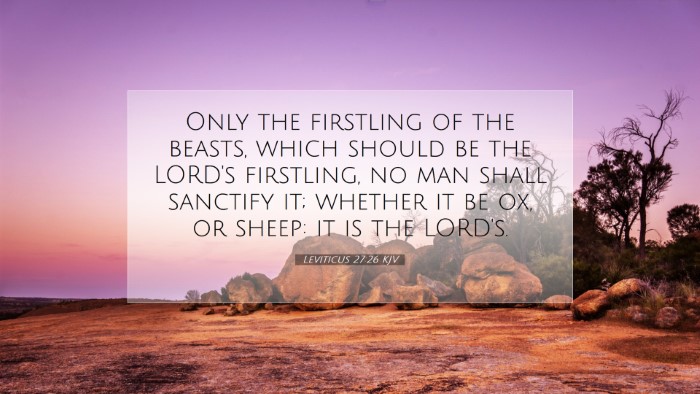Commentary on Leviticus 27:26
Leviticus 27:26 states: "Only the firstling of the beasts, which should be the LORD's firstling, no man shall sanctify it; whether it be ox, or sheep: it is the LORD's." This verse addresses the sanctification of firstborn animals in the context of their ownership and sacredness before God.
Overview and Context
This verse is situated within a chapter that discusses the laws concerning vows and the valuation of persons and things dedicated to the Lord. The firstborn signifies a portion of God’s creation that belongs wholly to Him, signifying both His authority and the sanctity required in the offerings made to Him.
Insights from Public Domain Commentaries
Matthew Henry's Commentary
Matthew Henry emphasizes the concept of the firstling being set apart for God. He remarks on how the firstborn represents the best of one's flock and, therefore, should be dedicated to the Lord without being subject to human discretion or valuation. Henry articulates that this dedication is a reminder of God's claim on the first and best of our possessions.
- The Nature of Firstborn Animals: Henry elucidates that the firstborn of animals holds a unique place in God’s covenant with His people. By designating the firstborn as the Lord's, the Israelites acknowledge His sovereignty and faithfulness.
- Ownership and Human Dedication: Henry points out that no man can sanctify the firstborn because it is already designated as holy by God's decree. Human attempts to designate ownership over what is God’s are futile and inappropriate.
Albert Barnes' Notes on the Bible
Albert Barnes provides insight into the practical implications of this commandment. He focuses on the cultural significance of firstborn animals among the Israelites, as well as their role in sacrificial practices observed throughout the Torah.
- Cultural Significance: Barnes notes that the firstborn was viewed as the most valuable part of one’s possessions. In a society where herding and agriculture were central, the firstborn represented not only economic value but also the future of a herd. The irreversible dedication to God thus posed a significant commitment.
- Theological Implications: He connects the firstborn of animals to the more profound theological truth of sacrifice and redemption. As the firstborn is given to God, it prefigures the ultimate sacrifice of Christ, who is referred to as the firstborn among many brethren (Romans 8:29).
Adam Clarke's Commentary
Adam Clarke offers a more nuanced understanding of the implications of this verse concerning the religious and social structure of ancient Israel. Clarke emphasizes that the sanctity of the firstborn extends beyond mere ritual.
- Religious Law and Society: Clarke suggests that the clear distinction made regarding the firstborn fosters a deeper societal reverence for God’s commandments. It instills an understanding of possession and rightful ownership that aligns with the Israelites' covenant relationship with God.
- Spiritual Reflection: In his reflections, Clarke invites readers to consider their own 'firstlings' or best offerings to God. This concept encourages believers to dedicate their primary efforts, time, and talents in service to God, analogous to the dedicating of the firstborn.
Theological Themes
This scripture reveals profound themes regarding ownership, dedication, and sacrificial living. Several theological principles emerge:
- Divine Ownership: This verse reaffirms the biblical principle that everything belongs to God (Psalm 24:1). By stating that the firstborn belongs to Him, God asserts His authority over His creation and calls for acknowledgment from His people.
- Holiness of Offerings: The concept of holiness in offerings implies that God desires purity and intention behind such sacrifices. This theme runs through the entirety of Leviticus, emphasizing that the act of giving must stem from sincere worship rather than mere obligation.
- Foreshadowing Redemption: The connection of the firstborn to Christ serves as a foreshadowing of the New Testament reality that connects sacrifice with salvation, as Christ's dedication to God ultimately provides grace for humanity (Hebrews 10:10).
Application for Believers
For pastors, students, and theologians, Leviticus 27:26 compels reflection on our personal sacrifices and what we dedicate to God. Here are some applications:
- Dedicating Our 'Firstfruits': Much like the firstborn animals, believers are called to set apart their best for God. This could include talents, time, resources, and priorities that exalt God’s sovereignty in our lives.
- Understanding the Cost of Discipleship: This verse challenges us to acknowledge that following Christ requires a commitment that may involve sacrifices of what we hold most dear—much like the Israelites' commitment to offering their firstborn.
- Living in Light of Redemption: As we consider the firstborn theme, we are reminded of our need for a Savior. The dedication of the firstborn encourages Christians to reflect on Christ’s sacrifice and to live lives that reflect gratitude and dedication to His service.
Conclusion
Leviticus 27:26 invites an exploration of themes surrounding sacrifice, ownership, and holiness. By delving into commentaries from esteemed biblical scholars such as Henry, Barnes, and Clarke, we resonate with the fundamental truths about our relationship with God. As believers engage with the text, the challenge is to reflect on our own lives, acknowledging what we dedicate to the Lord in our worship and daily practices.


